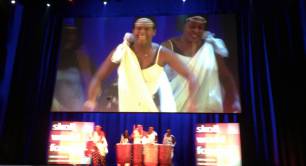From disruptive celebrities to rogue diplomats at the Skoll Awards
![[file:field_file_image_alt_text]](https://www.pioneerspost.com/sites/default/files/styles/node-teaser-large/public/images/article/yunus%20pic%202013.jpg?itok=uPaSnZAu)
As the Awardees of the Skoll World Forum recover from an evening of mingling and drinks at the Ashmolean Museum in Oxford, UK, Isabelle de Grave reflects on the Skoll Awards ceremony and dishes up the inspirational stories of an emotionally-charged event.
At the close of day two at the Skoll World Forum, the Skoll Awards Ceremony for social entrepreneurs has left me warmly wrapped up in the spirit of the event, and acutely aware that the social bug is catching.
Annie Lennox was the first to be commended with the award of funding for her SING campaign, which gives a voice to women with HIV and AIDS.
She burst onto the stage with an uninhibited outpouring against the mainstream media, for illuminating the world of celebrity, and neglecting the people on the frontlines of global issues from conflict to HIV.
“I want to disrupt the entire media!” she told the audience. “They are inordinately resourced, they have so much responsibility and they don’t do enough.” “I’m sorry,” she said, “But I am furious about this!”
Disrupting diplomacy was also on the agenda as Carne Ross, a British diplomat gone rogue, took the stage. He explained how his organisation Independent Diplomat, works to give marginalized groups access to international decision-making circles, where their interests are most at stake.
“As crazy as it sounds the United Nations were going to convene a meeting on the independence of South Sudan, without inviting a South Sudanese representative,” Ross explained on the giant projector screen, which punctuated the ceremony with documentaries on the work of each Skoll awardee.
He took the audience back to the night Pagan Amum—now Minister of Peace in Juba— who had been fighting for Sudanese independence for 30 years, prepared to participate for the first time in a diplomatic discussion of his country’s future: “He and I stayed up till late the previous night as he crafted his speech word by word,” Ross told us.
Harking back to his former profession, Ross said: “I had the arrogance to think I could move countries around like pieces on a chessboard. But I realised the few can never know more than the many.”
He urged the audience to rest assured that he knew he was doing the right thing: “Once I was on the hilltops of Imperial Rome in the villas drinking wine with others who had hollow eyes like me. Today I am out there in the rain with the slaves and as Spartacus said, it is a much better place to be.”
With a similar conviction, Gemma Mortenson inspired determination in everyone struggling against deeply entrenched social inequalities, likening her work at Crisis Action— coordinating the combined efforts of human rights organisations to push governments to act— to David battling with Goliath.
Goliath later morphed into a beast of cruelty and misconception, when Chris Underhill who set up Basic Needs, presented his mission to provide a community based programme for treating mental illness where systems of treatment don’t exist.
An image of a man, named Frances Camila, pinioned to a log in his house gave a graphic and lasting impression of a common reaction to mental health sufferers in some parts of the world, which brands them a menace and a sinner, requiring brutal restraint.
Before departing, Underhill made an impassioned call for an end to the humiliation, cruelty and cages used to punish sufferers of mental health issues in countries where the condition is greatly misunderstood, and left routinely left untreated.
Another award for achievements that push health systems to include those that go untreated, went to Gopi Gopalakrishnan for World Health Partners, which provides health and re-productive services in underserved areas by making market forces work for vulnerable communities.
Musthtaq Chapra of The Citizens Foundation, and Salman Amin Khan who set up the Khan Academy, were also awarded funds for their work to make education accessible to all, through the low-cost schools run by The Citizen’s Foundation and the open access online lessons produced by the Khan Academy.
The last in the procession of awardees was Nobel Laureate Muhamed Yunus, who won the special Global Treasure Award for his life’s work proving that the poor are credit worthy.
The founder of the Grameen Bank, which provides micro-loans to women in India, told us: “I never intended to be a banker… but that is what I do now. It’s because I wanted to create the solution to a problem.”
Magnified on the big screen of the ceremony theatre, Yunus shared the story of a women in torn clothes spinning thread outside of her house. She told him that to buy the loom to go into her spinning wheel, a trader would lend her 25 cents as long as she sold at the price that he set, not the market.
Making only 2 pennies a day, she had virtually been made a slave. Yunus tested an idea giving 42 women from Jobra a small loan of 27 dollars. It allowed them to club together and pay back the money, and work independently of the traders. From this experiment grew the Grameen Bank.
At the end of the ceremony a clear picture emerged of a world scattered with spots where people are meddling with the status quo and digging to uproot the injustices that feed into to systems of politics, education, health and finance. As the Skoll World Forum nears its end I can’t help but think these spots are contagious.
In the words of Richard Jefferson, a molecular biologist and innovation strategist who spoke in a plenary at the forum: “Everyone is biologically inclined towards innovation.” It is the big white elephant in the room, a system steeped in unequal power relations and battles for prestige that subdues the social bug inside us.



